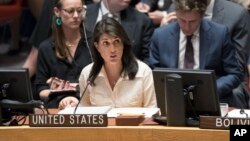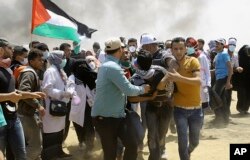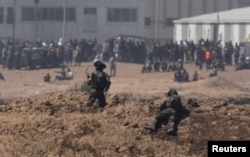The United States defended Israel’s actions to suppress sometimes violent demonstrations at its Gaza border at the United Nations Tuesday in the face of widespread criticism from other countries.
U.S. Ambassador NikkI Haley said Israel had used "restraint" in response to deadly clashes with Palestinians and blamed the Hamas militant group for the violence.
But U.N. Special Coordinator for the Middle East Peace Process Nickolay Mladenov, speaking to council members from Jerusalem, said there was "no justification" for the killings.
Mladenov said, "Israel has a responsibility to calibrate its use of force" if there is no "imminent threat of death or serious injury" and must protect its borders "proportionately and investigate every incident that has led to a loss of human life.
Haley dismissed assertions the violence stemmed from Monday's opening of the U.S. embassy in Jerusalem.
"It does not undermine the prospects for peace in any way. And yet, for some, this is supposedly a cause for violence. But let’s remember that the Hamas terrorist organization has been inciting violence for years, long before the United States decided to move our embassy."
Haley added the embassy "reflects the will of the American people" and "our sovereign right to decide the location of our embassy, a right that everyone in this room claims for their own country."
Kuwaiti Ambassador to the U.N. Mansour al-Otaibi said the Persian Gulf country "would like to condemn in the strongest terms the massacre perpetrated by the Israeli official authorities yesterday" and called on nations "to recognize the state of Palestine and occupied East Jerusalem as its capital."
Tuesday's U.N. Security Council emergency meeting followed the deadliest day of violence in Gaza between Israel and the Palestinians in five years.
Foes, allies condemn US move
Prior to the U.N. meeting, many U.S. allies, along with its foes, expressed criticism of the U.S. decision to open its embassy in Jerusalem, saying it would increase tensions in the Middle East.
A spokesman for British Prime Minister Theresa May said, "We disagree with the U.S. decision to move its embassy to Jerusalem and recognize Jerusalem as the Israeli capital" before a final peace agreement is reached in the Middle East.
French President Emmanuel Macron condemned Monday's violence in Gaza, where Israeli soldiers killed more than 50 Palestinian civilians in clashes at the border. Macron said he had "warned repeatedly of the repercussions" of U.S. President Donald Trump's decision to recognize Jerusalem as Israel's capital.
A statement from Macron's office said he talked Monday with Jordan's King Abdullah and Palestinian President Mahmoud Abbas and is planning to talk Tuesday with Israeli Prime Minister Benjamin Netanyahu.
Russian Foreign Minister Sergey Lavrov repeated Moscow's objection to the U.S. move. "We firmly believe that it is inappropriate to unilaterally revise the decisions of the international community in this way," he said.
Many Arab leaders also condemned the move, with Lebanese Prime Minister Saad Hariri calling it "provocative," and Iranian Foreign Minister Mohammad Javad Zarif describing it as "a day of great shame."
Saudi Arabia said it "strongly condemned" the Israeli gunfire against Palestinians in Gaza and opposed the relocation of the U.S. embassy.
Turkish President Recep Tayyip Erdogan said during a visit to London the embassy move was "very, very unfortunate" and said it disqualified the United States from being a mediator in the Middle East peace process.
Turkey’s government said it was recalling its ambassador to the United States “for consultations” over the U.S. embassy move. It also recalled its ambassador to Israel.
Turkey also has called for an emergency meeting of the Organization of Islamic Cooperation (OIC), the world’s largest body of Muslim-majority nations.







